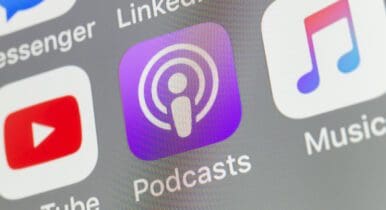iOS 26 is Out Next Week. Here’s What Campaigners Should Know
Apple is slated to roll out the latest update to its iPhone software on Monday, and it’s expected to have serious repercussions for voter contact.
The coming release of iOS 26 has set off a panic among political consultants, fundraisers and campaign workers since it was announced this summer. While the update has been heralded by iPhone users as a tangible effort to crack down on spam calls and text messages, some campaigners fear that their voter outreach efforts could be collateral damage.
Here’s what political pros should know about the software update:
New Call Screening and Text Message Filters
With iOS 26, Apple is introducing a suite of new features that it says will “eliminate distractions so users can focus on the conversations that matter most.” That includes new screening tools for phone calls and text messages intended to filter out spam and unwanted solicitations.
The software will allow users to automatically intercept calls from unknown numbers and prompt the caller to state their name and reason for calling. The iPhone user will then be able to decide whether to accept or reject the call.
Similarly, text messages from phone numbers not in a user’s contact list can be filtered into separate “unknown-senders” or “spam” folders. It’s worth noting that the spam filter will be enabled by default, while users will have to manually turn on the unknown-senders filter.
Challenges for Voter Outreach
The iOS 26 update has worried some political operatives, who fear that routine voter contact efforts – from fundraising outreach to GOTV texts – will be stymied by the new screening features. In a July memo, the National Republican Senatorial Committee warned that the update could cost Republicans more than $500 million in lost fundraising.
The worst case scenario, fundraisers and voter contact specialists say, is that voters simply won’t see text messages that are filtered away from their main inbox. If a user enables the unknown-senders filter, they won’t receive notifications for those messages and those conversations will only be accessible through a separate dropdown menu.
That’s a problem for political outreach, which often comes in the form of texts from phone numbers that aren’t saved in an iPhone user’s contact list. While users will still be able to review messages sent to their spam or unknown-sender folders, some campaigners worry that people won’t do so frequently, leaving many messages unread.
Potential Workarounds
Political pros are looking into options to get around the filters – or at least mitigate some of the pain. One solution: relational organizing, which boils down to mobilizing volunteers or paid workers to text or call people in their personal networks in support of a candidate, cause or organization.
Because those calls and messages would come from somebody a voter already knows, it’s more likely to ensure that outreach efforts actually get noticed.
Of course, relational organizing can be a bit harder to scale than traditional peer-to-peer texting and phone banking, especially for committees and outside groups that have relied on the same outreach tactics for years. Still, proponents of relational organizing argue that it’s ultimately more effective, because voters are more responsive when outreach comes from their friends or family than from unknown volunteers or campaign staffers.
WinRed, the Republican digital fundraising platform, has rolled out another workaround to iOS 26’s text filtering features: the contact card upsell. When donors give, they’ll be prompted to download a digital contact card for the organization reaching out to them, making it less likely that a campaign or organization will be sent to the unknown-senders folder in the future.

